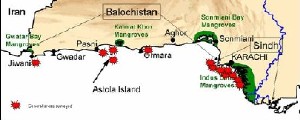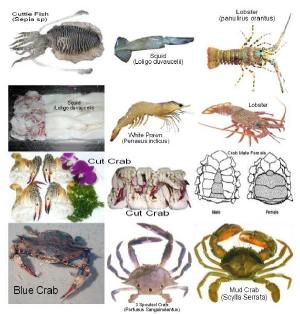Guest Post by A.R. Rafiq
 A couple of weeks ago the European Union announced a ban on all fish imports from Pakistan – worth more than US$ 80 million annually – because of poor quality products. According to the newsreport in The News:
A couple of weeks ago the European Union announced a ban on all fish imports from Pakistan – worth more than US$ 80 million annually – because of poor quality products. According to the newsreport in The News:
The government has finally received a verdict from the European Union, which informed Pakistani fishery authorities about de-listing of all the processing factories on quality grounds, effectively putting a ban on more than $80 million worth of exports. The fisheries sources confirmed the initial letter of the EU, which asked Pakistani authorities to stop consignments from the country to the 27-nation bloc, as they would not
be accepted after April 12… An official at the federal Ministry of Food, Agriculture and Livestock (MINFAL) said [that]… all the 11 seafood-processing units had been de-listed, which were earlier certified by the EU.
A three-member team of the EU’s FVO visited Karachi fish harbour in January 2007 to check fisheries’ facilities and quality of seafood being exported to its member countries. This trip was the second in two years after 2005. In February 2005, the EU team wrapped up its visit on warnings that Pakistani authorities should maintain seafood quality as per the set standards otherwise they would lose their largest seafood export market. But it appears nothing has changed in the time between, as irresponsible attitude and least interest of the institutions concerned made the country to pay the price second time in two years.
“The EU is the largest single market of the Pakistani,â€Â? said Sardar Hanif Khan, Chairman of Pakistan Seafood Industry Association (PSIA). “It would definitely hit almost half of the exports from the country and ultimately affect target negatively by the end of current financial year.â€Â? The EU decision sent ripples right from export bodies to the government institutions but poor fishermen appear to be main loser of the situation. “It is really very critical situation I believe,â€Â? said Ahmed Zameer Advocate, Director Vigilance at Fishermen Co-operative Society – a Sindh-represented body, which looks after fisheries operations. He said the federal government was responsible to maintain quality standards required by the EU. The federal institution failure would cause serious set back to the exchequer and endanger employment of hundreds of fishermen.
The State Bank of Pakistan in its report had informed that seafood exports were at $160 million by June 2006 up from $138.94 million exported during 2004-05, as the EU countries remained the largest buyers of the Pakistani products with more than 50 per cent share in total shipments.
I am of mixed feelings on this issue. The loss of the EU seafood market is a major blow to Pakistan’s economy. However, from an environmental and social prospective this can be seen as an opportunity. An opportunity to re-examine the fisheries and seafood export policies and slow down the industry – thus allowing the local marine wildlife an opportunity to play catchup.
 As a result of indiscriminate fishing and trawling and a lack of government regulations the fish population along the coastline has been severely depleted. Thus, harming the marine wildlife and natural ecosystem. That is an ecosystems which local fishermen have been part of for centuries.
As a result of indiscriminate fishing and trawling and a lack of government regulations the fish population along the coastline has been severely depleted. Thus, harming the marine wildlife and natural ecosystem. That is an ecosystems which local fishermen have been part of for centuries.
Some 20 years back there was an abundance of fish along the Karachi coastline. I have on numerous occasions been witness to boats arriving at the French Beach (Bulehjo) laden with large amounts of fish, in all shapes and sizes. You had “surmai” that that was longer than your arms length. All this was caught along the Makran Coastline (From Karachi to Gadiyani).
Other than large Surmai fish, you had unimaginable schools of parrot fish and groupers. Grouper is a rock fish once found in abundance right on the shore – now you talk to fishermen and local scuba divers they say the coastline is like a barren waste land. The the marine life is virtually non existent.
This devastation is primarily due to foreign trawlers that come into Pakistani waters and literally scrape the sea floor, lifting up everything that comes in the way of their gigantic industry grade nets.
As a result an ancient way of life, where man and nature once lived in harmony is fast disappearing. No thanks to the local, provincial and federal authorities.
AR (Abdulrahman) Rafiq is a technology professional in Silicon Valley and maintains multiple blogs including The Rabita Zone.




















































Thanks for bringing this issue to light. One seldom hears about this stuff and there is a need for more awareness.
This issue should be taken to the great Lal Masjid Adaalat. Maybe they ‘ll be able to solve this crisis as they know everything.
I am not an expert on eco-systems so cannot comment on that aspect. But from an economics standpoint its clearly a bad thing.
And it’s endemic, which makes it worse.
First PIA’s flights start getting banned and now this.
The issuue is a severe lack of management talent and application. Its good to make policies and have visions. But at some point someone has to roll up their sleeves and get down to work and make things happen. Thats where we seem to always fall a bit short.
Thank you for this. I think these are ther eal issues that effect real Pakistanis. But unfortaunetly we have to many muhafizs of ideology andnot enough people who are interested in things that make a difference to people’s lives.
This will effect the livelihoods of thousands and thousands of people…. and yet no one seems to care about this…. I guess people have more improtant things to do in philosophizing about the true meaning of Islam!
The first and last victims of this whole affair will be the labor employed by the fishing industry. They’re going to lose work and their livelihood until we can find an alternative market.
The authorities should have done something about htis long ago.